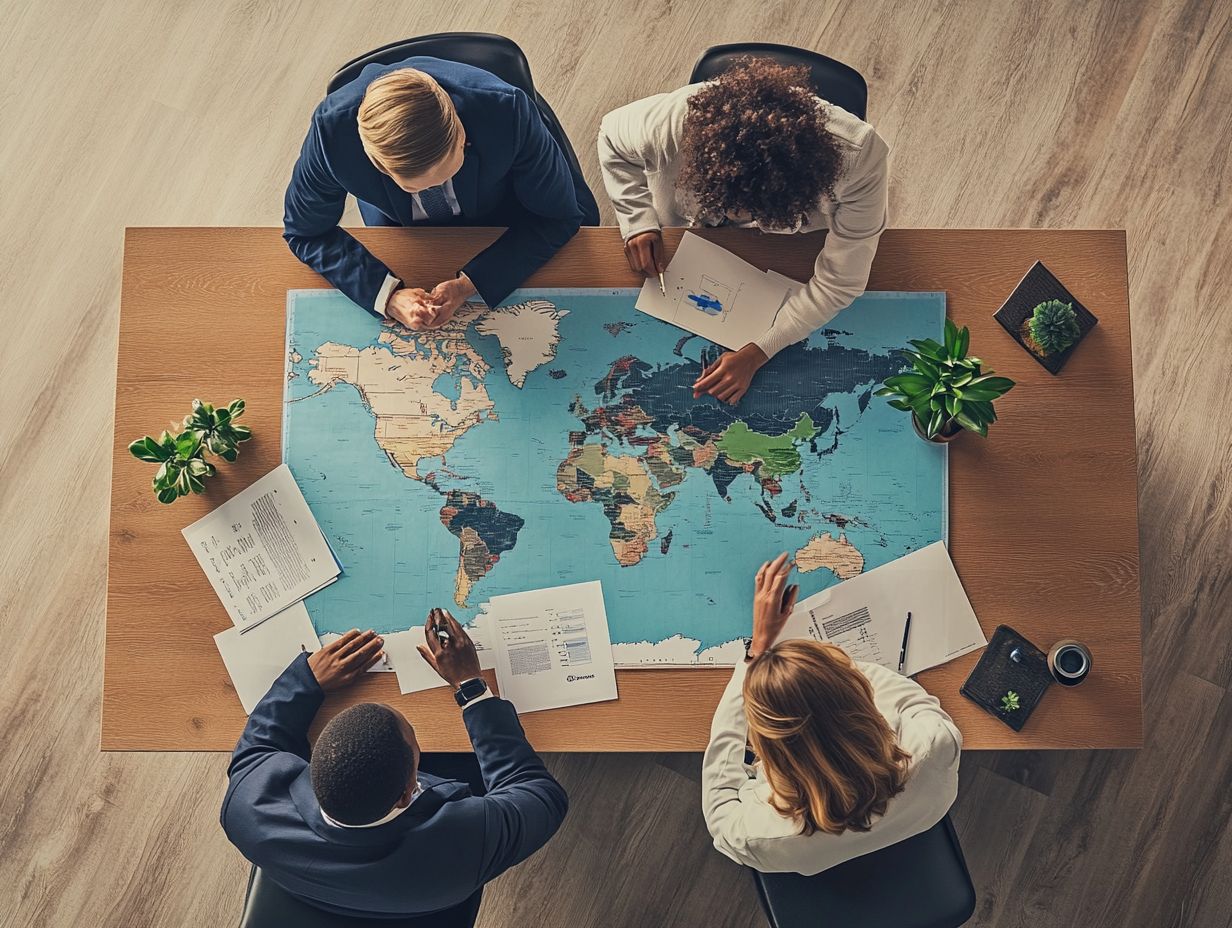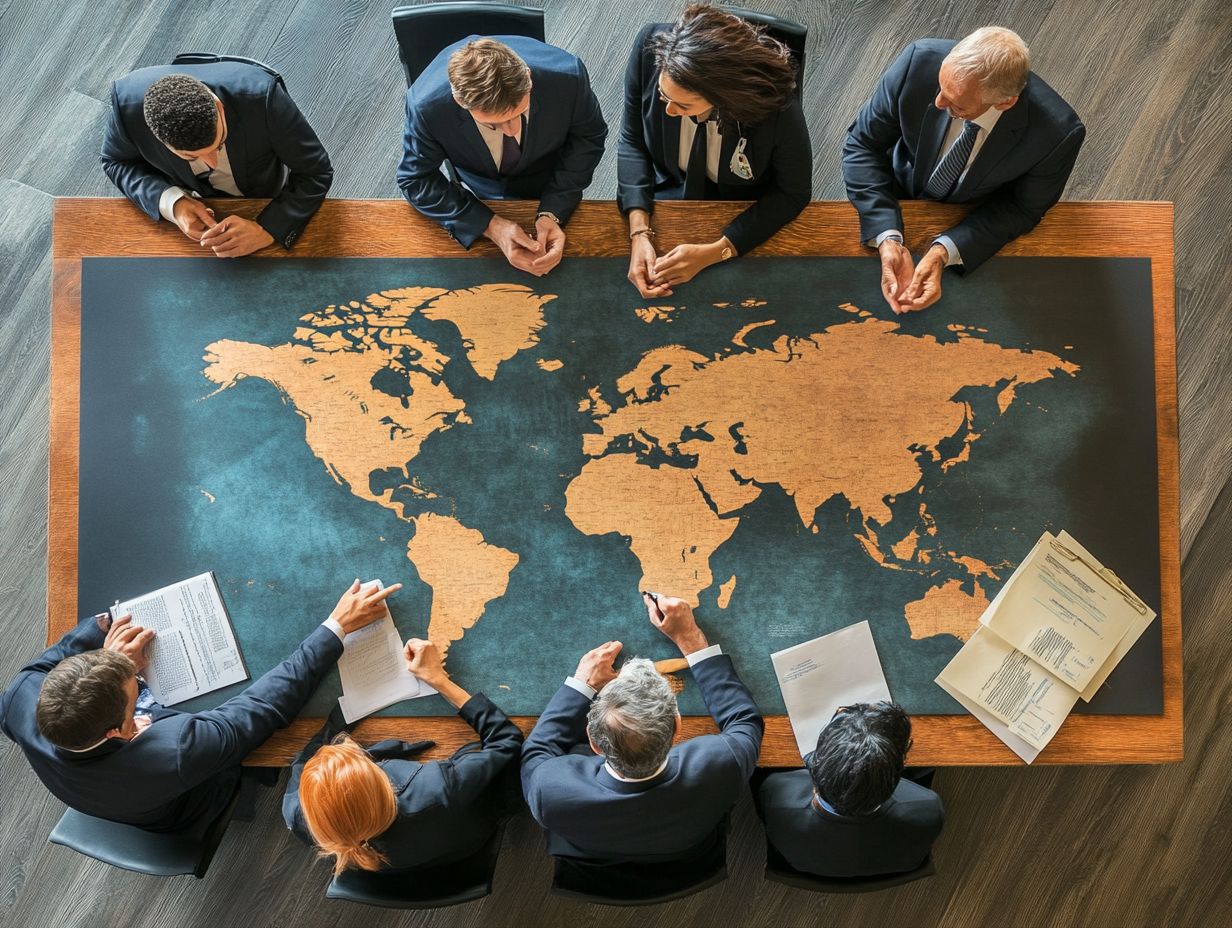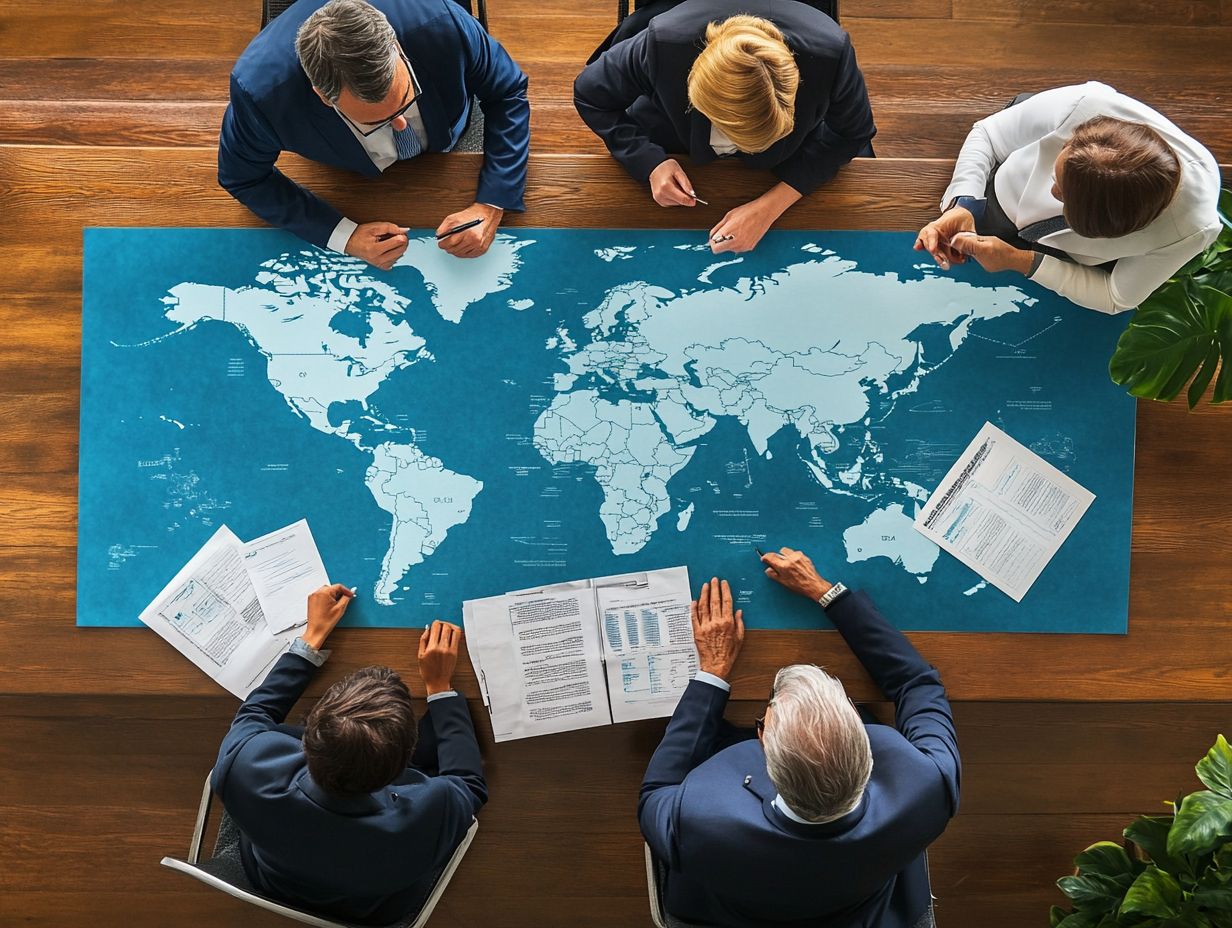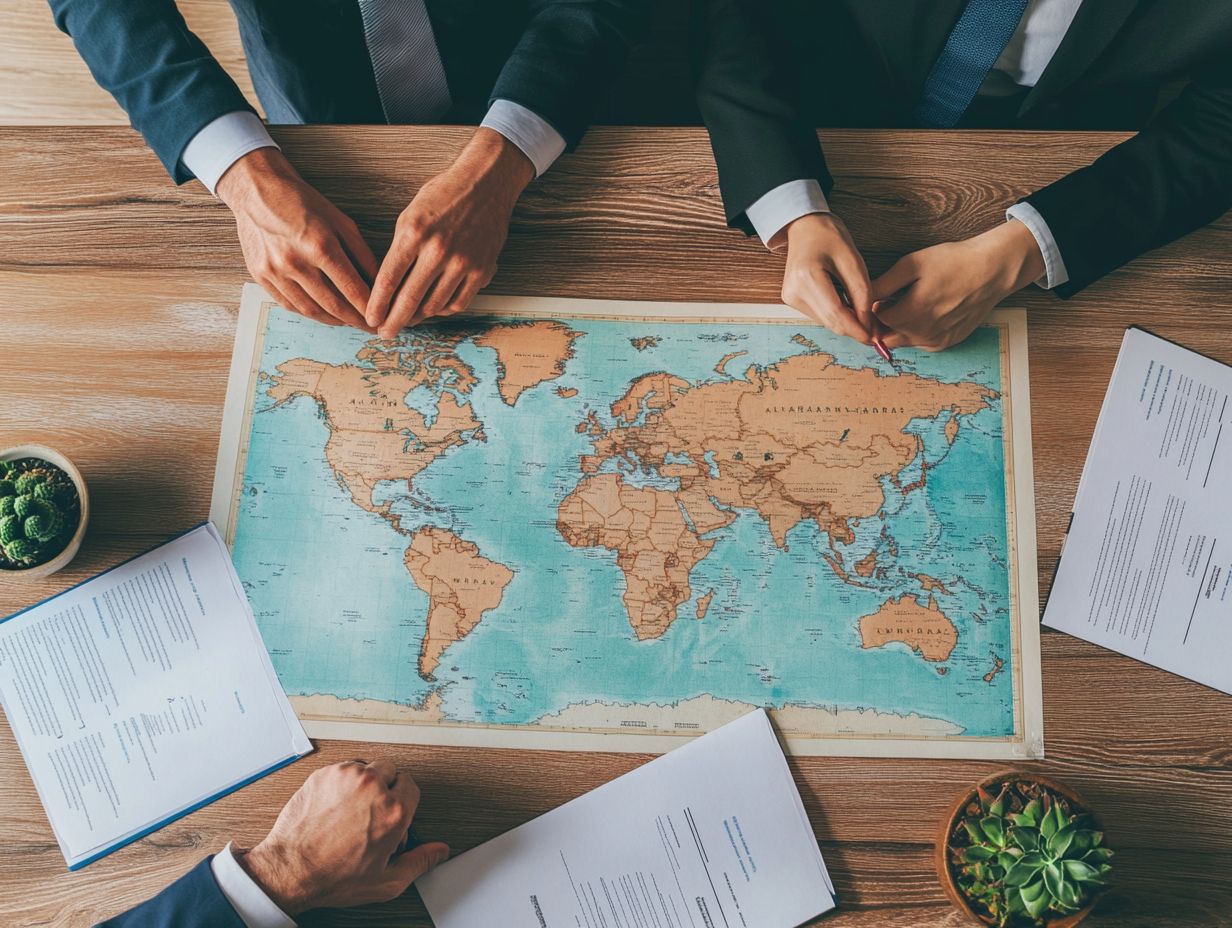5 Strategies for Global Trademark Protection
In today s interconnected world, ensuring the protection of your brand on a global scale has never been more essential.
This article explores five key strategies for protecting your trademark globally. From conducting comprehensive searches to navigating the intricacies of international registration systems like the Madrid System, you ll find invaluable guidance.
It also highlights the significance of collaborating with local legal counsel and addresses the common challenges businesses encounter when enforcing their trademarks.
By the end of this article, you’ll be ready to protect your brand globally!
Contents
- Key Takeaways:
- 1. Conducting a Comprehensive Trademark Search
- 2. Filing for International Trademark Protection
- 3. Registering with the Madrid System
- 4. Monitoring and Enforcing Your Trademark
- 5. Working with Local Counsel in Target Markets
- Why Is Global Trademark Protection Important?
- What Are the Key Differences Between Trademark Laws in Different Countries?
- What Are the Benefits of Registering with the Madrid System?
- How Can a Business Protect Their Trademark in Countries That Are Not Part of the Madrid System?
- What Are the Common Challenges in Enforcing Trademark Rights Globally?
- How Can a Business Stay Compliant with Trademark Laws in Different Countries?
- Frequently Asked Questions
- What are the 5 strategies for global trademark protection?
- Why is it important to register your trademark?
- How can doing detailed trademark checks help with global trademark protection?
- What is the importance of monitoring and enforcing your trademark?
- Why should caution be used when licensing your trademark?
- How can staying informed about international trademark laws benefit global trademark protection?
Key Takeaways:
- Conduct a thorough trademark search.
- File for international protection with the Madrid System to save time and money.
- Work with local counsel to monitor and enforce trademarks globally.

1. Conducting a Comprehensive Trademark Search
Conducting a comprehensive trademark search is essential if you want to protect your brand and steer clear of potential trademark infringement issues. In today s global marketplace, distinctive marks carry considerable value and contribute significantly to brand reputation.
This process involves several critical steps, including:
- Searching the United States Patent and Trademark Office (USPTO) database,
- Examining state-level registrations,
- Delving into common law trademarks that might not be formally registered.
By meticulously ensuring that no conflicting trademarks exist, you can significantly reduce the risk of legal disputes. Hiring a trademark lawyer can be very helpful; they have the expertise to uncover hidden conflicts and offer insights into the likelihood of securing a trademark.
Neglecting this vital search could lead to costly litigation or rebranding expenses, which can seriously affect your company’s financial health and market presence.
2. Filing for International Trademark Protection
Filing for international trademark protection is an essential step for any business aiming to elevate its brand in the global marketplace. It helps you get trademark rights in different countries and refine your overall trademark strategy.
This process also protects your intellectual property, which refers to creations of the mind, like trademarks, patents, and copyrights, building trust among consumers and signaling your commitment to quality.
When you set your sights on entering new markets, grasping the specific legal frameworks and trademark regulations of each country becomes crucial.
Partnering with experienced trademark services can simplify the application process, helping you navigate the often-complex local laws and customs with ease.
By investing in international trademark protection, you can significantly reduce the risks of infringement, especially when combined with 5 strategies for patent risk management, fostering sustained brand growth and unlocking new opportunities in an increasingly competitive landscape.
3. Registering with the Madrid System
Registering with the Madrid System provides you with a streamlined path to obtaining international trademark protection. The Madrid System is a way to make it easier for businesses to register their trademarks in multiple countries with one application and offers a wealth of advantages.
By utilizing this system, you reduce the complexities often associated with securing rights across multiple jurisdictions. A single application can encompass various member countries, saving you both time and effort.
The process kicks off when you file an application with your home country s office. This office then forwards it to the International Bureau of WIPO, where designated countries will review your application in accordance with their national laws.
The U.S. Patent and Trademark Office serves as your essential first point of contact, ensuring that your application aligns with local requirements before it is forwarded for ongoing compliance monitoring.
This method streamlines the process, making it urgent to act quickly if you want to expand your brand internationally!
4. Monitoring and Enforcing Your Trademark

Monitoring and enforcing your trademark rights is essential to safeguard your brand against potential infringements while maintaining consumer trust. This is especially important in competitive international markets, where trademark disputes can arise unexpectedly.
To manage this crucial aspect effectively, consider using trademark watch services. These services carefully watch new trademark registrations and alert you to potential conflicts. Regularly searching online databases and marketplaces can also help uncover unauthorized uses of your trademark.
If you detect infringements, taking immediate legal action is imperative. This could involve sending cease and desist letters to the offending parties, clearly outlining how their actions violate your trademark rights.
Should the situation escalate, pursuing infringement actions through the courts can help you reclaim your trademark’s integrity and deter future violations.
5. Working with Local Counsel in Target Markets
Your business needs local counsel in target markets to navigate the intricate landscape of trademark laws and ensure robust brand protection. Local attorneys bring invaluable expertise in regional trademark strategies and enforcement mechanisms.
They understand local regulations, which allows them to offer tailored advice that aligns perfectly with the specific conditions of the market you’re entering. For instance, they can pinpoint cultural sensitivities that might influence how your trademark is perceived, helping you sidestep potential conflicts.
When it comes to trademark registration, local counsel can assist you in preparing and filing applications, ensuring every detail complies with jurisdiction-specific requirements. They also monitor potential infringements and can advise you on effective enforcement strategies.
By leveraging local counsel, you’re not just streamlining the trademark process; you’re significantly enhancing your overall brand security in competitive markets.
Why Is Global Trademark Protection Important?
Global trademark protection is crucial for your business as it seeks to expand in an interconnected world. It secures your trademark rights across various jurisdictions and bolsters consumer trust, which can help leverage IP for competitive advantage while contributing positively to the broader business economy.
Prioritizing global trademark protection enhances brand recognition on a larger scale, ensuring that your identity remains consistent and recognizable, no matter where you operate. Additionally, implementing strategies from 5 ways to strengthen your trade secret protections further supports this consistency, fostering consumer loyalty and making customers more likely to return to a brand they trust, which significantly impacts your repeat sales.
The financial fallout from trademark infringement can be severe. When prominent brands face counterfeit challenges, the resulting loss in revenue and reputation can take years to mend.
Take Adidas, for instance. The company has successfully defended its brand against numerous counterfeiters worldwide, leading to increased consumer confidence and profitability. This example underscores how a robust strategy for global trademark protection mitigates risks and fosters sustainable business growth.
What Are the Key Differences Between Trademark Laws in Different Countries?
Understanding the key differences between trademark laws in various countries is essential for business owners. These laws can vary significantly in terms of registration requirements, enforcement mechanisms, and principles of first-to-file versus common law rights.
For example, in the United States, you can establish trademark rights through actual use in commerce, reflecting a common law approach. In contrast, many European countries prioritize registration, emphasizing a first-to-file system. This discrepancy profoundly affects your trademark strategy as you venture into international markets.
If you overlook these differences, you may encounter challenges like overlaps or conflicts with existing trademarks. Choosing between statutory protections and common law principles shapes your ability to defend your brand effectively in various jurisdictions.
It’s crucial to develop a comprehensive global trademark strategy to adeptly navigate these complex landscapes, including understanding how to protect your trademark internationally.
What Are the Benefits of Registering with the Madrid System?

Registering with the Madrid System makes securing international trademark registration a breeze. It offers numerous advantages, including lower costs, streamlined procedures, and enhanced opportunities for brand growth across multiple jurisdictions.
This system allows you to file a single application that can cover several countries. This significantly reduces the administrative burden typically associated with trademark registration.
By consolidating your applications, you can sidestep the complexities and delays that often arise from navigating different legal frameworks. You can use the time and resources you save for other important operations, including innovation and marketing.
This efficient approach paves the way for quicker and more effective expansion of your brand’s presence in foreign markets, driving both recognition and profitability.
How Can a Business Protect Their Trademark in Countries That Are Not Part of the Madrid System?
For businesses that aim to protect trademarks in countries outside the Madrid System, crafting a tailored trademark strategy is essential. This strategy should include local registration and collaboration with local experts, as well as following tips for choosing a strong trademark to ensure comprehensive protection for your brand.
Engaging local professionals who understand the laws that protect brands and inventions helps you navigate the complexities of trademark filings with greater ease.
Their local knowledge streamlines the application process and aids in identifying potential conflicts with existing trademarks, paving a smoother path to securing your rights.
You ll find that adopting direct registration strategies can be immensely beneficial. This proactive approach not only strengthens your market position but also protects you from costly disputes. Conducting thorough market research to pinpoint the appropriate classes for your goods or services is crucial.
What Are the Common Challenges in Enforcing Trademark Rights Globally?
Enforcing trademark rights on a global scale presents various challenges for businesses, including differing legal landscapes and varying levels of enforcement rigor. To navigate these complexities, consider these 5 tips for conducting international IP searches to mitigate the risk of trademark disputes that can complicate your international strategies.
These obstacles can differ dramatically from one country to another, making it essential to grasp local regulations and the cultural nuances that influence trademark protection. For those dealing with patents, consider these 5 tips for navigating international patents.
Without a trademark attorney’s expertise, navigating international trademark law could lead to costly missteps and lost opportunities.
These legal professionals offer invaluable insights into regional enforcement practices, help devise tailored strategies for safeguarding your brand, and represent you in any disputes that may arise.
Leveraging a trademark attorney’s expertise is vital for ensuring your brand’s integrity and maintaining a competitive advantage in diverse markets.
How Can a Business Stay Compliant with Trademark Laws in Different Countries?
Staying compliant with trademark laws in various countries requires understanding local regulations, engaging in ongoing trademark maintenance, and collaborating with local counsel to navigate the ever-changing legal landscape.
This continuous monitoring is essential, as trademark laws can differ significantly from one jurisdiction (the legal authority of a region) to another, impacting everything from registration processes to enforcement measures.
By actively engaging in trademark maintenance, you protect your brand and ensure you remain in sync with evolving legal frameworks.
Local counsel becomes an invaluable ally, providing insights into specific legal nuances, helping you navigate potential challenges, and advising on timely renewals and disputes.
This proactive approach paves the way for smoother international operations and minimizes the risks associated with non-compliance.
Frequently Asked Questions

Here are some common questions about trademark protection.
What are the 5 strategies for global trademark protection?
Here are five key strategies for global trademark protection: register your trademark, conduct detailed checks, monitor usage, license carefully, and strengthen your trademark by staying updated on international laws.
Why is it important to register your trademark?
Register your trademark for legal protection and exclusive usage rights in registered countries.
This helps stop others from using it without permission.
How can doing detailed trademark checks help with global trademark protection?
Detailed trademark checks help you avoid conflicts with existing trademarks.
They ensure your trademark stands out and is available in your target markets.
What is the importance of monitoring and enforcing your trademark?
Monitoring and enforcing your trademark keeps your exclusive rights intact.
Actively search for unauthorized use and take necessary legal action.
Why should caution be used when licensing your trademark?
Be cautious when licensing your trademark.
Ensure it aligns with your brand values to protect your reputation.
How can staying informed about international trademark laws benefit global trademark protection?
Stay updated on international trademark laws to navigate protection complexities.
This helps you anticipate challenges and take proactive steps.






